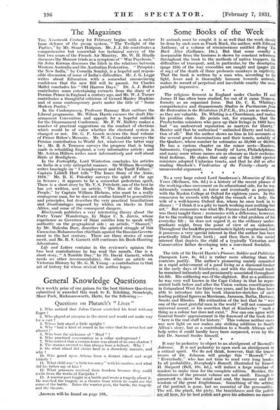The religious ferment in England under Charles II and James
II has often been studied, for out of it came Noncon-
formity as an organized force. But Dr. C. E. Whiting's comprehensive and dispassionate Studies in Puritanism from the Restoration to the Revolution (S.P.C.K., 21s.) are as welcome as they are'Valuable. Dr. Whiting is a Churchman, and makes his position . clear. He points out, for example, that the Presbyterian -ministers who gave up their livings in 1662 have had an -undeserved reputation as martyrs for liberty." Baxter said that he authorized " unlimited liberty and tolera- tion of all." But the author shows no bias in his accounts of the several great denominations and their tenets, notably of the Quakers,. whose number he estimates as 50,000 or 60,000, He has a curious chapter on the minor sects—Ranters, Salmonists, Coppinists, the Family of Love, Philadelphians, and many more whose names are as obscure as their ecclesias- tical fashions. He states that only one of the 2,000 ejected ministers adopted Unitarian tenets, and that he did so after reading -Sherlock's Vindication of the Trinity—clearly an
unsuccessful argument. - * * *










































 Previous page
Previous page